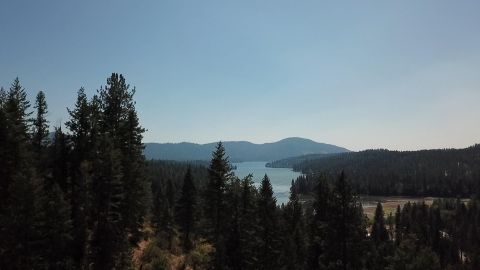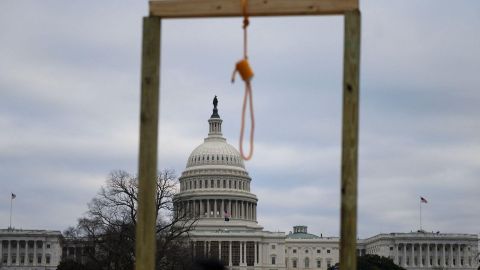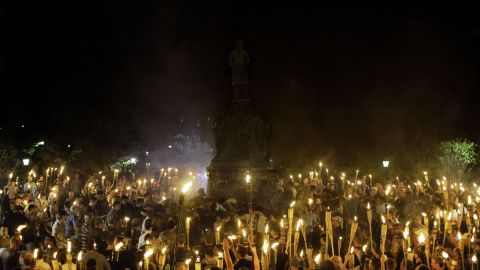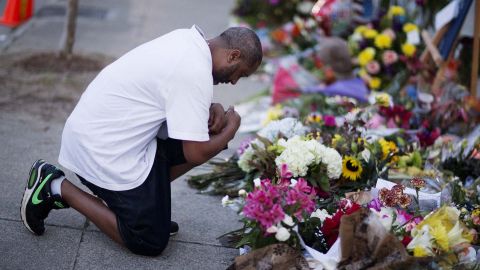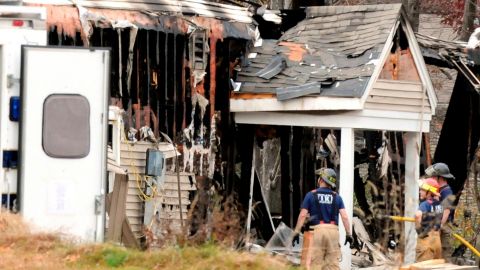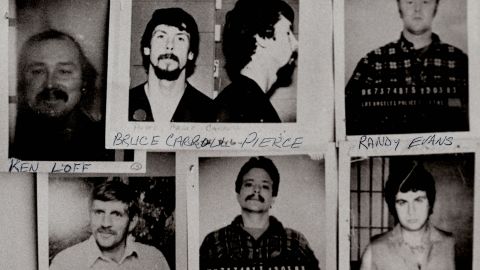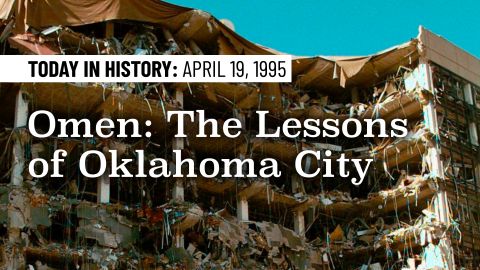PRESIDENT JOE BIDEN: Domestic terrorism from white supremacists is the most lethal terrorist threat in the homeland.
MARK POTOK, Senior Fellow, Centre for Analysis of the Radical Right: Why is the radical right growing? Why are these ideas resurging in such a dramatic way?
TEXT ON SCREEN: Demonstrators: You will not replace us!
PETE SIMI, Assoc. Professor, Chapman University; Author, “American Swastika”: We’ve been unwilling to really grapple with our history. We have to understand where this problem has been in the past and what’s kept us from addressing it.
News Reporter: Police say it was a car bomb, perhaps as big as 1,000 pounds.
KERRY NOBLE, Former Member, The Covenant, The Sword and the Arm of the Lord: As soon as I saw it, I said they’ve done it. They finally have done it. The right-wing has crossed the line.
BILL MORLIN, Journalist (1946-2021): It wasn’t until 1995 that the message of domestic terrorism really came home in this country.
EXTREMISM IN AMERICA
LONE WOLF
News Reporter: It is apparently the single deadliest terror attack on U.S. soil ever.
Text on Screen:
OKLAHOMA CITY
APRIL 19, 1995
News Reporter: The motive behind the madness is unknown at this hour. Whoever did it, the governor said, is some kind of animal.
Two days after a bomb blew apart the Oklahoma City federal building, killing 168 people, the FBI had its main suspect: an Army veteran named Timothy McVeigh. Though he had an accomplice, McVeigh was the main force behind the bombing.
News Reporter: They say McVeigh acted alone the day of the bombing. He did have an accomplice beforehand.
POTOK: The reason that the Oklahoma City bombing was not stopped, before it actually occurred, was that almost nobody knew about the bombing in advance.
Tom O’Connor investigated domestic terrorism for the FBI in the wake of the bombing.
THOMAS O’CONNOR, Former Special Agent, F.B.I.: Tim McVeigh is the epitome of the lone wolf. But even a lone wolf still has to be part of something that gets them to that point.
McVeigh started to become disillusioned with the government while fighting in the 1991 Gulf War. It was around that time that he read The Turner Diaries, a neo-Nazi propaganda novel about white supremacists who wage war on the federal government.
POTOK: He read and reread and reread that book. And he fully absorbed the message of The Turner Diaries, that the government is the enemy of the people.
McVeigh sold the book at gun shows, where he became even more steeped in the ideas of a growing extremist movement that feared the government would take away people’s freedom.
O’CONNOR: In The Turner Diary (sic) the lead character actually blows up the FBI building. Tim McVeigh used The Turner Diary as a blueprint.
NOBLE: It was the first time anybody came out with what could be considered the plan on overtaking the government.
Kerry Noble, a former extremist, says the federal building in Oklahoma had been a target for the movement because it housed several federal agencies. He was a member of a group that plotted to destroy the building 12 years before McVeigh’s attack.
NOBLE: They wanted something that would send out a very, very strong message of the intention of the right-wing movement in those days, which was to have war.
Man on phone: They’re shooting at us at Mount Carmel. Tell them there are women and children in here and to call it off.
One incident would convince McVeigh the time for war had come. In 1993, federal agents raided the compound of a religious sect in Waco, Texas. Around 80 people died, including 25 children.
POTOK: Tim McVeigh actually went to Waco.
News Reporter: The man in the background, sitting on the car, is Tim McVeigh.
Waco became a rallying cry for the anti-government movement.
POTOK: On the far right in this country, Waco was the convincing last straw that the government had in fact become a murderous tyranny.
Citizens militias sprang up across the country.
Militia member: And I promise you we’re not going to give up our guns.
By 1995, there were close to 450 of them.
News Reporter: This is the Michigan militia, a self-proclaimed fighting force of ordinary citizens preparing to defend themselves against the federal government.
Mike Vanderboegh, who died in 2016, was inspired by Waco to become one of the leaders of the Sons of Liberty militia.
MIKE VANDERBOEGH, Sons of Liberty Militia (2014 Interview): Do we serve the government or does the government serve us? These kinds of fundamental questions hardly ever get settled without violence.
Text on Screen: Reporter: We got a hot flash, get ‘em back!
News Reporter: About a third of the building has been blown away.
POTOK: McVeigh murdered 168 people, including 19 small children, as a direct, retaliatory attack on the government for Waco.
O’CONNOR: When later asked about the 19 children that were killed, he said that he felt bad that that happened, but that was just part of the follow-on of war.
PRESIDENT BILL CLINTON: It was an act of cowardice and it was evil.
MORLIN: It wasn’t until 1995 that the message of domestic terrorism really came home in this country, unquestionably. And it was after the Oklahoma City bombing that the Justice Department woke up.
FBI DIRECTOR LOUIS FREEH: We must intensify our focus on the threat to America from within.
O’CONNOR: The FBI started going in and finding out where the violence is and getting in front of the violence, making arrests.
NOBLE: You’ve got every agency in the government coming out after people. That scares you if you’re in the movement. You start to see the reality of what could happen.
The government crackdown and the horror of the Oklahoma City attack helped lead to the decline of organized militias, many of which condemned the bombing. By the end of the ‘90s, they had all but disappeared.
O’CONNOR: People kind of go to ground, but the problems did not go away at all. It was still there. It just went underground a little bit.
MORLIN: The underlying sentiment was, we hate the federal government. And that has not gone away. The whole notion that government is imposing its will on us has bonded together a whole new generation and whole new groups of people.
Brian Murphy, a former counterterrorism official at the FBI and Department of Homeland Security, says we’re seeing the consequences of the country’s attention shifting away from domestic extremism after September 11.
BRIAN MURPHY, Former Counterterrorism Official: We really took our eyes off of a lot of other things, including,uh, white supremacy and domestic terrorism. For the most part, it wasn’t looked upon as important. The movement basically never ceased. But they bide their time. And then they just wait.
END

